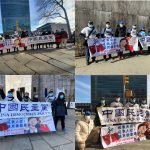乐恒转自:民生观察
| 英国医学杂志关注中国精神迫害问题 刘飞跃 |
| 作者:民生编辑1 文章来源:本站原创 更新时间:2010-07-04 23:55 |
| 民生观察工作室2010年7月4日消息,英国著名医学杂志“British Medical Journal”近日刊发文章关注中国的精神迫害问题,并对本工作室刘飞跃及国内维权人士黄雪涛律师等进行了访谈。 这篇名为China’s psychiatric hospitals help to stifle dissent, say NGOs的文章由Jane Parry、Weiyuan Cui合作撰写。文章首先介绍了河南徐林东被关精神病院六年的情况,由这个案子引到了中国的精神迫害现象。 刘飞跃在接受采访时,谈到了本工作室《中国精神病院受难者数据库》收录精神迫害案例的最新情况,同时还谈到了受害者在精神病院内遭虐待等相关情况。 维基百科显示,英国医学杂志 (British Medical Journal,简称 BMJ),是一份在全世界广受欢迎及阅读的同行评审性质的综合医学期刊。期刊由BMJ出版集团公司(BMJ Publishing Group Ltd)(属于英国医学协会(British Medical Association))所发行,其它相关出版的刊物包括有广受欢迎的附属期刊诸如:神经学、神经外科学与精神病医学期刊(The Journal of Neurology, Neurosurgery and Psychiatry),心脏医学期刊,胸腔医学期刊(Thorax),其它的还有,如:学生BMJ期刊(Student BMJ) 主要是为全球医科学生而发行。 附“British Medical Journal”文章的全文: China’s psychiatric hospitals help to stifle dissent, say NGOs Jane Parry Hong Kong Weiyuan Cui geneVaIn 2003, Xu Lindong, a farmer from Yancheng county, Henan province, China, decided to file a petition in Beijing to help his neighbour pro-test about maltreatment at the hands of local officials in a land dispute. Xu never filed his petition, however. On the outskirts of Beijing he was intercepted by a Daliu township gov-ernment official and a policeman, taken home, and subsequently incarcerated in Zhumadian Psychiatric Hospital, Henan, at the request of township and county government officials. Six and a half years later in April 2010, Xuwas released from Luohe Psychiatric Hospital,also in Henan province, where he had spent thelast five months of his ordeal, after being trans-ferred there from Zhumadian Hospital. When hemet the media he described barbaric treatmentwhile in hospital, including being given elec-tric shocks 54 times and being forced to take chlorprothixene and chlordiazepoxide, drugswhich made him feel faint and dizzy. Xu’s family did not know what had happened to him until July 2007. “Someone from his home town visited other patients in the same hospital as Xu and he managed to ask the visitor to get a message to his family,” says Xu’s lawyer, Chang Boyang. The family tried to secure his release, but it was only when journalists brought the case to the attention of the lawyer Chang that sufficient public pressure mounted in the media to get him out. “I obtained Xu’s medical record, which showed that between February and December 2009, the Daliu township government paid an average of 1500 yuan (£148; 177; $219) a month for the cost of Xu’s incarceration,” says Chang. Four government officials who were involved were later fired from their posts. Xu’s case is, it seems, just the tip of the ice-berg. Lawyers, human rights activists, jour-nalists, and bloggers have been collating and exposing evidence of widespread abuse of the psychiatric hospital system, with “troublemak-ers” incarcerated without any formal psychiatric evaluation or due legal process. The situation has received widespread media and internet coverage in China. “Since October 2009 we have collected datafrom the media, our own volunteers, affectedindividuals, and human rights organisationsoverseas on more than 500 cases. The majority of them are petitioners, as well as rights activists and dissidents,” said Liu Feiyue, founder othe Wuhan based non-government organization Civil Rights and Livelihood Watch. “When normal citizens are put into psychi-atric hospitals the situation is very grave. They are often forced to take medicine or injections, and when they don’t cooperate they report being bound, beaten up, force fed, and electro-cuted,” Liu says. “As social conflicts in China have intensified in recent years the number of petitioners has increased and so has the number of normal citizens being incarcerated in psychiatric hospitals.” It is a phenomenon that suits both local government officials, who want a swift solution to citizens who protest about their activities to higher authorities, and psychiatric hospitals, which are under pressure to be self financing in a healthcare system that since the 1990s has left hospitals to largely fend for themselves. In addition to petitioners complaining about local officials’ malfeasance, there are also cases of families and employers using this method to deal with troublesome employees and relatives, observers say. “Treatment is only available when there is someone willing to pay. If they have the money and the motive they can send someone to psy-chiatric hospital,” says Huang Xuetao, a lawyer at the Shenzhen branch of Beijing Horizon Law Firm, who has taken on numerous cases involv-ing involuntary psychiatric commitment. “The whole psychiatric hospital system is commercialised, and as long as payment con-tinues, the patient cannot leave without the per-mission of the sender. Even if there is a medical decision that the person is ready to leave; they can’t until the sender settles the bill.” In addition to psychiatric hospitals under the Ministry of Health there are at least 23 known “ankang” (literally “safety and health”) maxi-mum security forensic hospitals under the con-trol of the Public Security Bureau. All staff are police officers, including the psychiatrists and nurses, and there is no professional separation of custody and treatment. Use of psychiatric hospitals for political sup-pression has been a longstanding practice in China since the 1950s, when Soviet experts were invited in to establish China’s psychiatric hospital system based on the Soviet model, says Robin Munro, deputy director of the Hong Kong based non-government organisation China Labour Bulletin, who has extensively researched political abuse of psychiatry in China.Calls from the BMJ to the Ministry of Health were not answered. (责任编辑:admin) |







